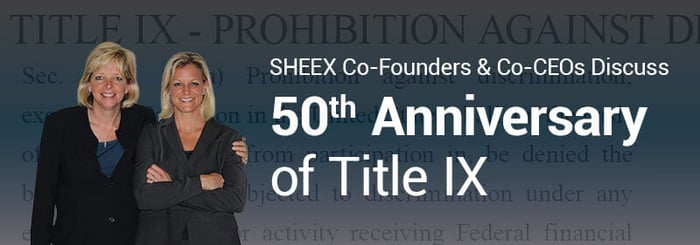Today marks the 50th Anniversary of Title IX being signed and put into action. If you haven’t heard the story of SHEEX, it is important to know that Title IX holds a special place in the hearts of Co-Founders & Co-CEOs, Susan Walvius (SW) and Michelle Marciniak (MM). We sat down with them to learn more about what impact Title IX has had on them and what other progress they would like to see come from this historic bill.
As a quick refresher for the audience, here are some highlights of Michelle and Susan’s athletic careers.
Susan played basketball at Ger-Field High School in Northern Virginia and was an All-American her Senior year. From there she went on to play at Virginia Tech University on a full scholarship. She was hired as the youngest Division 1 Women’s Basketball Head Coach at Virginia Commonwealth University. After coaching for five years at VCU, she went on to be the Head Coach at West Virginia University. She finished her career at the University of South Carolina where she received the honor of being the SEC Coach of the Year in 2002.
During her high school career, Michelle was named Gatorade National Player of Year. She went on to play basketball at Notre Dame until she transferred to The University of Tennessee from 1993-1996. Michelle played in two national championship games, helping coach Pat Summitt win her fourth national title in 1996. That year, Michelle earned the title of MVP during the Final Four. She also played in the American Basketball League and finished her playing career with the WNBA.
Read more about how SHEEX started here.
What does Title IX mean to you?
SW: Title IX to me means opportunity. Opportunity to learn, lead, mentor, grow and compete. Our company, SHEEX, may not exist without its impact. Title IX was, and will always be, a crucial step toward equality in women’s athletics.
MM: I have played on traveling AAU teams since I was 11 years old. I was noticed by Division I basketball coaches because of my participation in National AAU tournaments. I am grateful and appreciative as I know this is where the benefits of Title IX kicked in.
How has Title IX helped both your athletic and professional careers?
SW: Title IX provided scholarships for an education, experienced coaches to learn from, facilities and resources to compete, and life skills to grow as a person. The life skills learned through sports easily transfer to starting a business. You win with talent, teamwork, and experience. You won’t win every game, but it is important to learn from the past, reset, have goals, and move forward.
MM: This is something that I learned front and center when I arrived on campus at the University of Tennessee. The very first meeting in our Lady Vol locker room, Pat Summitt, the most iconic women’s coach ever to coach the game, made it clear that we were going to learn about Title IX and why we should feel privileged to be sitting in her locker room. It was a lesson that started from day one and continued every day for the rest of my career at Tennessee. And I got it. I listened, observed, and grew increasingly humble with each passing day.
How did your experience as an athlete prepare you for your professional career?
SW: As an athlete you face big challenges, and you prepare. You focus on the long-term vision, and you do the work every day to gradually achieve it. It’s interesting to me that 94% of women executives have a background in sports and 50% have participated at university levels.
What do you wish to see from Title IX’s impact in another 50 years?
SW: We’ve come a long way, but there is still a lot to be accomplished. Title 9 protects all people from discrimination based on sex in education programs or activities, yet sex discrimination and sexual harassment still exists. 50 years after the enactment of title 9 there remains financial disparity in that many schools do not provide equitable resources for men and women’s sports.
MM: One of the things I learned was to never compare yourself to another man. My story written by AP News about Chris Webber, summarizes my Title IX experience to a “T.” Did I like being National High School Player of the Year? Yes. It was a true accomplishment. Did I like the result of the salary discrepancy? No, not at all. It opened my eyes that even though we are making monumental strides in basketball, we have SO MUCH FURTHER to go.
Parting words from Michelle:
The last question I have is…. Would a man ever say that they played on a girls' team to gain a competitive advantage in sports? Emphatically No. Until it’s cool for men to think that women’s sports are equitable, we are far from equality. My mountain to climb right now is trying to see if entrepreneurship holds the same biases.






